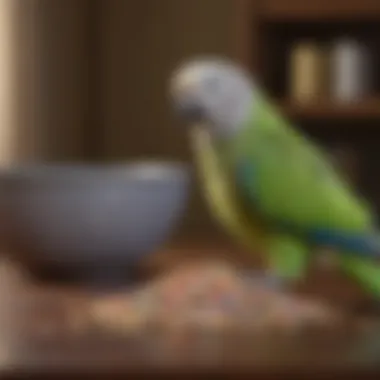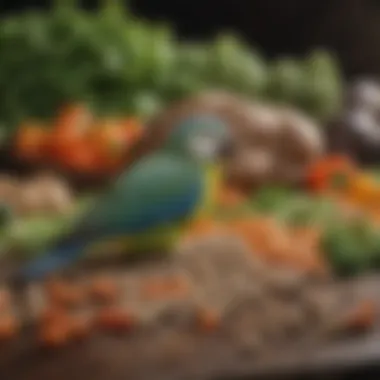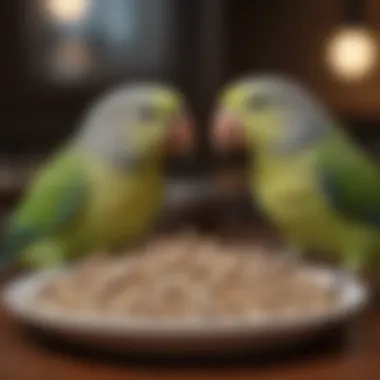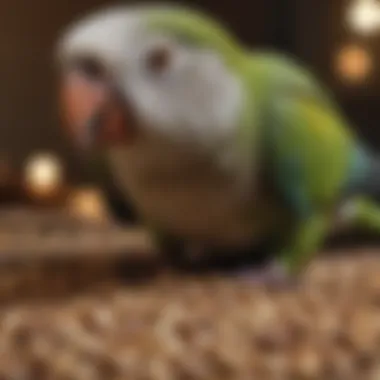Pellets for Quaker Parrots: Nutrition & Best Practices


Intro
Understanding the nutritional needs of Quaker parrots is paramount for their overall well-being. This article focuses on the importance of pellets as a primary source of nutrition, which plays a crucial role in their health. In this guide, readers will gain insights into the nutritional composition of quality pellets, advantages they offer over other food types, and the best practices for incorporating them into a Quaker parrot's diet. We will also address common concerns associated with transitioning to pellets, thereby enabling pet owners to make informed choices.
Understanding Your Pet
Pet Behavior Basics
Quaker parrots, known for their intelligence and sociable nature, exhibit a variety of behaviors that owners should understand. These small parrots often form strong bonds with their caregivers. Recognizing their natural tendencies can help in creating a comfortable environment. Their curious and playful demeanor requires stimulation, both mental and physical. Without proper engagement, they may develop behavioral issues, making it essential to provide interactive toys and social interaction.
Common Breed Characteristics
The Quaker parrot, also known as the monk parakeet, is a small, green bird with a distinctive grey breast. They are lively and vocal, often mimicking sounds and speech. Quaker parrots usually weigh around 80 to 100 grams and have a lifespan that can exceed 20 years with appropriate care. Their striking abilities to learn tricks and communicate can turn them into cherished companions.
Species-Specific Needs
Each species has unique dietary requirements. Quaker parrots thrive on a balanced diet that includes a range of nutrients. Pellets have been developed to provide essential vitamins and minerals necessary for their growth and health. It is critical to select high-quality pellets designed specifically for parrots to ensure they receive adequate nutrition.
Pet Care and Maintenance
Feeding Guidelines
Feeding a Quaker parrot involves offering a variety of foods, with pellets making up a significant portion of their diet. When selecting pellets, scrutinize the ingredient list. Good pellets should contain a mixture of ingredients, such as grains, seeds, and fruits. Fresh vegetables and limited fruits can be offered alongside pellets to enhance their diet further. Monitoring portion sizes is essential to prevent obesity, as they can be prone to weight gain.
Grooming Essentials
Regular grooming is vital to keeping Quaker parrots healthy. Their feathers should be checked for matting, and they need a bath or mist weekly to maintain feather condition. Their beaks should be inspected regularly for signs of overgrowth, which can affect their eating habits.
Hygiene Practices
Proper hygiene practices in the cage area are essential to prevent disease and promote a healthy environment. Daily cleaning of food and water dishes is necessary. Additionally, the cage should be cleaned thoroughly on a weekly basis, ensuring that perches and toys are sanitized to reduce the risk of bacterial growth.
Training and Development
Basic Commands and Skills
Training Quaker parrots involves patience and consistency. Teaching basic commands like
Understanding Quaker Parrots
Understanding the unique nature and nutritional requirements of Quaker parrots is crucial for their health and well-being. These birds, also known as Monk Parakeets, are highly social and intelligent creatures. They require a balanced diet to thrive, and pellets play a substantial role in meeting their dietary needs. Knowing their characteristics and dietary aspects will help caregivers provide the best care possible.
Species Characteristics
Quaker parrots are small to medium-sized parrots, typically measuring about 11 to 12 inches in length. Their plumage is predominantly green, with a distinctive grayish breast and white face. Quakers are known for their charming personalities and ability to mimic sounds and human speech.
They are social birds, often thriving in environments where they can interact with humans or other birds. Due to their social nature, they require a stimulating environment to stay happy and healthy. Behaviorally, these birds exhibit playful tendencies and can develop strong bonds with their human caregivers.
Dietary Needs
The dietary needs of Quaker parrots are specific and require attention. They need a varied diet rich in nutrients to maintain optimal health. Unlike some other bird species, they cannot survive on seeds alone. A diet consisting of pellets, fresh fruits, vegetables, and occasional seeds provides the necessary balance.
Important factors to consider include:
- Essential Nutrients: Quaker parrots require proteins, healthy fats, vitamins, and minerals for overall health.
- Caloric Intake: Monitoring their caloric intake is essential to prevent obesity, which can lead to various health issues.
Proper understanding of their dietary needs lays the groundwork for a suitable pellet selection and feeding strategy.
Nutritional Requirements
Understanding the nutritional requirements for Quaker parrots is vital for their overall health and wellbeing. These parrots have unique dietary needs that must be met to avoid deficiencies and ensure optimal growth. The right nutrition can prevent health issues and promote longevity. By focusing on essential nutrients and caloric intake, caretakers can provide balanced diets for their Quaker parrots.
Essential Nutrients
Proteins
Proteins play a crucial role in the growth and repair of tissues in Quaker parrots. They are fundamental for maintaining feathers, muscles, and organs. A diet rich in high-quality proteins can enhance immune function and support an active lifestyle. It is important to include both animal and plant sources of protein in their diet.


A key characteristic of proteins is their role in muscle development. Muscles enable movement and agility in parrots. For example, including cooked beans or certain legumes can serve as a beneficial choice. These protein sources offer numerous advantages, but too much protein can lead to health problems, particularly in kidney function.
Fats
Fats are another essential nutrient for Quaker parrots. They provide energy and are necessary for the absorption of fat-soluble vitamins. This macronutrient is vital for feather health and can help maintain skin moisture. High-quality sources include nuts and seeds, such as walnuts or sunflower seeds.
Fats are a beneficial choice as they serve as concentrated energy for active birds. However, moderation is key. Too much fat can lead to obesity and associated health issues, like heart diseases.
Vitamins
Vitamins are critical for Quaker parrots, supporting various functions in the body. For instance, vitamin A is essential for vision and immune function, while vitamin D aids in calcium absorption. Including a variety of fresh fruits and vegetables ensures that birds receive a spectrum of vitamins.
The unique feature of vitamins is their tightly linked roles in metabolic processes. A balanced intake prevents deficiencies that might lead to serious health concerns. However, over-supplementing with vitamins can be harmful, leading to toxicity and further health complications.
Minerals
Minerals are crucial for many bodily functions in Quaker parrots. Key minerals include calcium, phosphorus, and magnesium, which are important for bone health. Calcium is especially critical for breeding birds. Therefore, providing mineral-rich foods, such as leafy greens or cages with cuttlebone, is advantageous.
A notable property of minerals is their role in enzymatic reactions and overall metabolism. No less important than other nutrients, minerals should not be overlooked. An imbalance, however, can lead to diseases like metabolic bone disease, highlighting the need for a balanced diet.
Caloric Intake
Caloric intake is an important consideration for the feeding of Quaker parrots. Maintaining an appropriate daily caloric intake supports activity levels and prevents health issues, such as obesity or malnutrition. Different factors, such as age, weight, and activity level, influence how much energy a parrot requires.
It's essential to provide a varied diet that includes pellets, fresh food, and occasional treats. This prevents boredom and ensures they receive necessary nutrients. By monitoring daily intake visually, caretakers can adjust serving sizes accordingly.
Pellets: The Ideal Choice
Pellets play a crucial role in the nutrition of Quaker parrots. These formulated diets provide a consistent source of essential nutrients, leading to better health compared to other feeding options. Choosing pellets can simplify the pet owner's task of ensuring adequate nourishment, ultimately benefitting the bird's overall well-being.
Benefits of Pellets
Nutritional Balance
Nutritional balance is a key feature of pellets that ensures Quaker parrots receive all necessary nutrients in proper amounts. A well-balanced pellet is formulated to contain a mix of proteins, fats, vitamins, and minerals. This combination eliminates the risk of dietary deficiencies that can arise from a more varied diet, such as seeds and fresh fruit. Furthermore, pellets are designed to meet the specific needs of birds, which can also contribute to their longer lifespan and improved quality of life.
Reduced Waste
Reduced waste is another significant advantage of feeding pellets to Quaker parrots. Unlike seed-based diets, where a bird may discard shells and uneaten seeds, pellets are consumed entirely. This not only makes feeding cleaner but also leads to less mess in the cage. Furthermore, feeding pellets typically results in a more predictable amount of food intake, which can help in monitoring the health of the bird, as changes in consumption can indicate possible health issues.
Convenience
Convenience is a defining characteristic of pellet-based diets. Pellets are easy to store, measure, and serve, which can save time for pet owners. Unlike fresh foods or complex mixes, which require preparation and careful handling, pellets reduce the workload associated with feeding. This straightforward feeding method is especially beneficial for busy families or anyone new to bird care. While pellets are user-friendly, it's essential to ensure that they are stored correctly to maintain their freshness and nutritional quality.
Types of Pellets
Seed-based Pellets
Seed-based pellets are formulated with seeds as a primary ingredient. While they provide a familiar taste for many parrots, they may not offer as broad a range of nutrients as other pellet types. These pellets often appeal to Quaker parrots because they resemble their natural diet to some extent, making the transition to pellets easier. However, relying solely on seed-based pellets may lead to nutrient imbalances over time if the formulation is not carefully balanced.
Vegetable-based Pellets
Vegetable-based pellets prioritize ingredients sourced from vegetables. This type of pellet may offer higher fiber contents, promoting better digestion in Quaker parrots. The variety of flavors in vegetable-based pellets can be appealing, encouraging birds to eat more enthusiastically. However, these pellets can sometimes be less palatable for certain birds, and care must be taken in ensuring that they complement a bird's entire diet.
Organic Options
Organic pellets are made from natural ingredients, free from synthetic pesticides and additives. For owners who are conscious about what their pets consume, organic pellets can be a compelling choice. These pellets are often perceived as healthier because they minimize exposure to potentially harmful chemicals. However, they can be more expensive and may not be as readily available as conventional options. Pet owners must weigh these factors against the benefits of ensuring their birds consume clean products.
Comparing Pellets to Other Food Sources
Understanding how pellets compare to other food sources is essential for Quaker parrots' health. This section assesses the relative merits of different diets, including fresh foods and seed diets. Doing so helps pet owners make informed choices about their parrot's nutrition.
Fresh Foods
Fresh foods constitute a critical aspect of a Quaker parrot's diet. These foods include fruits, vegetables, and leafy greens, all of which are rich in vitamins, minerals, and hydration. However, fresh food alone cannot provide all the necessary nutrients that pellets offer.
Benefits of Fresh Foods


- Nutrient Variety: Fresh foods provide a broad spectrum of nutrients that promote overall health.
- Hydration: Many fresh fruits and vegetables have high water content, which helps keep parrots hydrated.
- Behavioral Stimulation: Offering different fresh foods encourages foraging behaviors, making meals more engaging.
Considerations
- Spoilage: Fresh food can spoil quickly, leading to waste if not consumed in a timely manner.
- Nutritional Balance: While fresh food adds variety, it may not supply a complete nutritional profile on its own. It is essential to combine fresh foods with pellets to achieve balanced nutrition.
Seed Diets
Seed diets have been commonplace for many bird owners. They are easy to store and usually well-liked by parrots. However, relying solely on seeds can lead to nutritional deficiencies.
Advantages of Seed Diets
- Taste Appeal: Seeds are often high in fat and carbohydrates, making them palatable to many birds.
- Accessibility: They are widely available and come in various mixes catered for different bird species.
Disadvantages
- Nutritional Imbalance: Seed diets typically lack essential vitamins and minerals. Quaker parrots need a more diverse diet that includes these nutrients.
- Obesity Risks: High-fat content in seeds can contribute to obesity and related health problems.
When evaluating food options, consider the long-term health impact on your Quaker parrot. Relying solely on seeds or fresh foods may not provide the balanced nutrition they need.
In summary, while fresh foods and seed diets have their benefits, incorporating quality pellets into a Quaker parrot's diet is vital for optimal nutrition. Pellets offer a comprehensive solution that minimizes the risks associated with unbalanced diets.
Transitioning to Pellet Diet
Transitioning to a pellet diet is a crucial aspect for the health and well-being of Quaker parrots. Pellets offer a nutritionally complete option, designed specifically for avian dietary needs. When moving from a seed diet or fresh foods to pellets, it is important to do so with care to ensure that the birds adapt well. A sudden shift may cause digestive upset or aversion to the new food. Thus, a gradual adjustment is preferred.
This section outlines the steps for a smooth transition, detailing the benefits and considerations associated with this dietary change.
Gradual Prolusion
A slow and patient approach is key to introducing pellets to your Quaker parrot. Birds often have established preferences, and altering that can be challenging. Begin by mixing a small amount of pellets with the regular food, such as seeds. Over time, increase the proportion of pellets to seed. This method helps the birds familiarize themselves with the new texture and taste.
Key points during this phase include:
- Observe reactions: Monitor how your Quaker parrot reacts to the pellets. Look for signs of interest or rejection.
- Limit other options: Reduce the availability of favorite seeds to encourage the bird to explore the pellets.
- Consistency: Keep a regular feeding schedule while introducing the new food.
A period of approximately two to four weeks is generally suggested for the transition, adjusting based on individual preferences.
Monitoring Preferences
Once pellets are introduced, it is essential to observe your Quaker parrot's feeding behavior. Some birds may take to pellets quickly, while others may take longer to adjust. Keep an eye on their eating habits and overall health during this time.
Consider the following when monitoring preferences:
- Weight checks: Regularly weigh your parrots to ensure they are maintaining a healthy weight during the transition.
- Behavior changes: Watch for any shifts in their behavior, such as increased curiosity or changes in activity levels.
- Experimentation: If the bird is hesitant, try various brands or types of pellets to find one that appeals.
It is important to be patient and encourage exploration of the new diet. Over time, most Quaker parrots will adopt pellets as their main food source, ultimately leading to improved health.
A gradual approach to transitioning to pellets can prevent stress and encourage a healthier diet for your Quaker parrot.
Common Concerns
Addressing common concerns about pellet diets for Quaker parrots is vital for maintaining their health and happiness. Pet owners often worry about potential deficiencies and behavior changes when switching to pellets. Understanding these aspects empowers owners to make informed dietary decisions, ensuring the well-being of their birds. This section explores two significant concerns: vitamin deficiencies and behavioral changes.
Vitamin Deficiencies
One primary worry with a pellet-based diet is the possibility of vitamin deficiencies. While quality pellets are formulated to provide balanced nutrition, it’s essential to ensure they contain all necessary vitamins. Quaker parrots require vitamins A, B, D3, E, and K, among others, for optimal health.
Birds might show signs of deficiency through various symptoms, including:
- Feather plucking or abnormalities
- Poor beak and nail health
- Lethargy or low energy
To mitigate this risk, choose high-quality pellets with a fortified vitamin profile. Regular vet check-ups can also help monitor nutrient levels and adjust the diet accordingly. Additionally, incorporating fresh fruits and vegetables can provide a natural source of vitamins, complementing the pellet diet.
A well-rounded approach to nutrition is key for your Quaker parrot, blending pellets with fresh food can address possible deficiencies effectively.
Behavioral Changes


Transitioning to pellets might lead to changes in your Quaker parrot's behavior. These changes can range from reduced interest in eating to increased vocalization or even aggression. Understanding these behavioral shifts is crucial for a smooth transition.
Common behavioral responses include:
- Curiosity towards new food: Some birds may take time to inspect pellets before eating.
- Increased vocalization: A parrot may communicate more if feeling uncertain about its new diet.
- Adjustments in social behavior: Changes in diet can sometimes lead to shifts in a bird's interaction with humans or other pets.
To facilitate this transition, provide patience and reassurance. Gradually mix pellets with their preferred foods, and be observant of the bird's interactions. Over time, Quaker parrots typically adapt to their new feeding routine, often displaying more enthusiasm as they become accustomed to pellets.
In summary, addressing vitamin deficiencies and behavioral changes can enhance the experience of adopting a pellet diet. Staying vigilant and responsive to your Quaker parrot’s needs will lead to a healthy and harmonious environment.
Choosing Quality Pellets
Selecting quality pellets for Quaker parrots is crucial for their overall health and well-being. Due to their unique dietary needs, Quaker parrots benefit from pellets that provide a balanced mix of essential nutrients. Quality pellets can prevent various health problems and ensure that the bird receives all necessary vitamins and minerals. Therefore, understanding how to evaluate and select these products is fundamental for any pet owner.
Reading Labels
When reading labels on pellet packages, it is essential to understand the ingredient list and nutritional information. The first aspect to pay attention to is the type of ingredients used. Pellets should contain a wide variety of whole foods, seeds, grains, and vegetables. Check for a high-quality protein source at the top of the ingredient list. Look for specific mentions of sources like soybean meal or egg.
Consider the fat content too. Healthy fats like those from omega-3 fatty acids are beneficial, while excessive unhealthy fats can lead to obesity and other issues. Ensure the pellets contain a mix of vitamins. Vitamin A, D3, and E should be included, as these are important in maintaining a Quaker parrot’s health.
Tip: Always avoid pellets that list any unknown fillers or artificial ingredients. They might not provide the necessary nutrition.
Brand Recommendations
Choosing a reputable brand can further help ensure that the pellets you select are beneficial. Some recommended brands known for their specific formulations for Quaker parrots include Harrison's Bird Foods, Lafeber, and Kaytee. Each of these brands undergoes rigorous testing and has a reputation for providing high-quality products.
However, it’s important to note that no one brand is universally perfect. Individual birds may have unique preferences or nutritional needs. It is wise to experiment with different brands to see which one your Quaker parrot enjoys the most while meeting their nutritional requirements. Pay attention to how your bird reacts to the new pellets, including their eagerness to eat them and signs of good health.
Feeding Guidelines
Feeding guidelines are essential for pet owners to ensure their Quaker parrots receive the right nutrition. These guidelines help maintain optimal health, providing balance in diet and preventing nutritional deficiencies. Understanding feeding frequency and portion control can foster a more enjoyable feeding experience for both the bird and the owner.
Feeding Frequency
Establishing a consistent feeding frequency is crucial for Quaker parrots. These birds thrive on routine. Feeding them at the same times each day helps create a sense of stability in their environment. Most avian experts suggest offering pellets twice a day, supplemented with fresh fruits and vegetables.
Research indicates that Quaker parrots can eat more than they need if food is constantly available. Thus, limiting the number of feeding times may prevent overeating and promote healthier eating habits. An ideal approach is to serve the primary pellets in the morning and refill with fresh fruits in the evening, ensuring that the diet remains varied and nutritionally rich.
Key Points for Feeding Frequency:
- Feed twice a day for routine.
- Use fresh fruits and vegetables as supplements.
- Avoid constant access to food to prevent overeating.
Maintaining a schedule allows you to monitor how much food your Quaker parrot consumes, while also encouraging them to eat more fresh produce, which is important for overall health. This approach may also prevent boredom and stimulate their foraging instincts.
Portion Control
Portion control is vital in managing a Quaker parrot’s diet. Given their energetic nature, it is essential to measure the amount of pellets served during each feeding session. A general guideline is to provide about one to two tablespoons of pellets per feeding, but this can vary based on the bird's size and activity level.
Too much food can lead to obesity and related health issues. Assessing your parrot’s body condition regularly can be helpful in adjusting portion sizes as needed. Typically, healthy Quaker parrots have a waist that is evident when viewed from above and a body that feels firm but not overly fat.
Some helpful strategies for portion control include:
- Using a measuring spoon for accuracy.
- Observing your parrot's activity level—active birds may need more calories.
- Removing uneaten pellets to ensure freshness and reduce waste.
Assess and Adjust: It's important to monitor your Quaker parrot’s weight and health. If there are any drastic changes, consult an avian vet for tailored advice.
Resources for Pet Owners
In the journey of caring for Quaker parrots, having access to appropriate resources is crucial. These resources not only enhance the understanding of a parrot’s nutritional needs but also aid in addressing any concerns regarding their diet. The right information empowers pet owners to make informed decisions that promote the well-being of their feathered companions.
Providing Quaker parrots with the right pellets is essential, and resources available to pet owners can simplify this task. Understanding what constitutes high-quality pellets, recognizing the importance of proper portion control, and being aware of potential vitamin deficiencies are just a few benefits of utilizing these resources. Additionally, resources can offer practical tips for transitioning from other diets to pellets, ensuring that the change is smooth for both pets and their owners.
Expert Consultations
One of the most reliable resources pet owners can leverage is expert consultations. These interactions with veterinarians or avian specialists bring tailored advice to individual situations. Experts provide insights into nutritional needs specific to Quaker parrots. They can help identify signs of deficiencies, recommend suitable pellet options, and create a feeding plan that meets the pet’s unique requirements.
Consultation with professionals invites a deeper understanding of the bird’s health needs. The importance of regular check-ups cannot be overstated. This is where experts can help assess whether the parrot is thriving on the pellet diet or needs adjustments.
Online Communities
In addition to professional consultations, online communities serve as valuable platforms for pet owners. Forums and social media groups enable the sharing of experiences and advice among individuals with similar interests. These online spaces can foster a sense of community where both new and experienced parrot owners exchange tips on feeding, caring, and training.
Members of these communities tend to discuss various brands, share pellet reviews, and present solutions to common problems. They may address issues like transitions to pellets or suggest recipes that incorporate pellets into a balanced diet.
Such communal learning enhances the knowledge base of pet owners, allowing them to navigate their parrot care journey with confidence.







